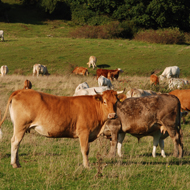Vets urged to be vigilant for lumpy skin disease

LSD was detected in the European Union for the first time last August, when Greece reported two outbreaks.
Vets are being urged to look out for skin wheals and unexplained abortions in cattle this summer and autumn, as these could be early signs of lumpy skin disease (LSD).
Once confined to Africa, LSD was detected in the European Union for the first time last August, when Greece reported two outbreaks.
More than 100 further outbreaks occurred between September and December 2015 and the disease reappeared in April of this year. Almost simultaneously, it was found in a second EU country, Bulgaria, and the Former Yugoslav Republic of Macedonia.
Professor Kenton Morgan, from the University of Liverpool, wrote in Veterinary Record (Vol 178 No 20) letters: 'Early recognition is imperative in limiting the impact of novel or exotic diseases.
'Where clinical signs are easily visible, as is the case with LSD, there is a need for those who regularly observe cattle… to be vigilant for the appearance of skin wheals or lumps. Skin wheals, whether palpable or visible, and unexplained abortions should trigger the addition of LSD to the list of differential diagnoses. Look out also for swelling in the legs and lymph nodes.'
The transmission of LSD is not well understood, making it difficult to assess the risk of spread, Prof Morgan added. Vaccination is a major control strategy.



 The Animal and Plant Health Agency (APHA) has updated its online reporting service for dead wild birds.
The Animal and Plant Health Agency (APHA) has updated its online reporting service for dead wild birds.